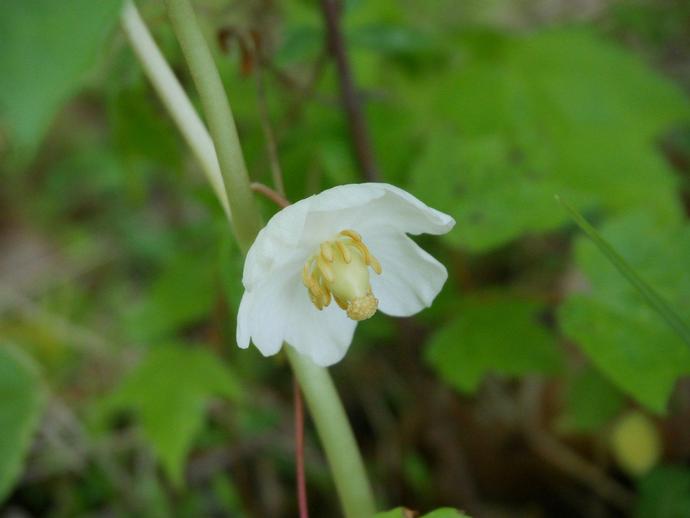December 23, 2020
Ben is taking a well-deserved holiday vacation, so we're reaching into the archives for today's #BenInNature update! The following post was originally published on April 29, 2020.
The mayapple (Podophyllum peltatum), also known as American mandrake and ground lemon, is fairly widespread across the eastern U.S. and southeast Canada. These plants can grow about a foot tall and produce umbrella-like leaves. In the spring, they produce white or yellow flowers (I've also read they can produce red flowers, although I've never seen one myself). By the summer, these flowers turn into a fleshy fruit that can be either green, yellow, or red -- it's like nature's traffic light!
From what I've read, all parts of the plant are toxic, although the fruit can be eaten "in small amounts" if the seeds are removed. Since we all have different definitions of "a small amount" (for example, I consider a pint of ice cream to be a single serving) it's probably not worth risking it.
The rhizome of the mayapple (which is an underground stem resembling a root) produces very small amounts of a toxin known as podophyllotoxin. This substance is highly toxic if eaten, but once refined in a lab, it can be used as a key ingredient in a topical cream to remove warts. Scientists have attempted to replicate podophyllotoxin in the lab, but while they have been successful, the yields have been so low that it's more efficient to get the toxin straight from the source.
ABOUT #BenInNature
Social distancing can be difficult, but it presents a great opportunity to become reacquainted with nature. In this series of posts, Administrator of Science Ben Williams ventures outdoors to record a snapshot of the unique sights that can be found in the natural world. New updates are posted Monday - Friday, with previous posts highlighted on the weekends and the week of December 21 - 25.
NEW: TRIVIA CHALLENGE
You've seen the posts. You've learned the facts. Now, it's time to prove you are a #BenInNature Mega Fan! The museum's education team has developed the #BenInNature Trivia Challenge to identify the most devoted fans out there! Everyone who successfully answers each trivia question correctly will be congratulated by having your own nature selfie posted to the museum's #BenInNature Mega Fan Photo Album on the official VMNH Facebook page! Learn more and download the trivia challenge today by visiting www.vmnh.net/research-collections/beninnature-trivia-challenge.
NATURE PHOTO IDENTIFICATIONS
If you discover something in nature that you would like help identifying, be sure to message us right here on Facebook with a picture (please include location and date of picture) and we'll have our experts help you identify it!

 Hours & Admissions
Hours & Admissions Directions
Directions

